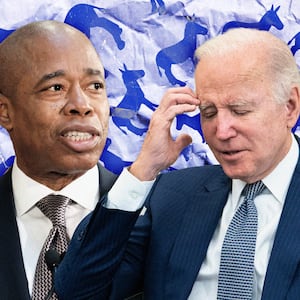Joe Biden’s mandate was to restore norms and work across the aisle to heal the country’s toxic political culture—in other words, to not be Donald Trump.
This past week demonstrated how he has failed to live up to that promise. In particular, his speech in Atlanta serves as a microcosm for a disappointing year of leadership that has cratered his popularity.
The president compared opponents of changing Senate filibuster rules, in order to pass Democratic voting rights bills, to notorious racists like Bull Connor, George Wallace, and Jefferson Davis. In so doing, Biden is appropriating Trump’s method of otherizing adversaries and casting political opponents as “enemies of the people” and “human scum.”
That doesn’t mean the president shouldn’t ever talk tough. I recently applauded Biden for his forceful rhetoric attacking the Jan. 6 Capitol rioters. In that instance, Biden’s words were appropriate for illiberal right-wingers who incited and participated in an attack on democracy.
A few short days later, however, Biden broadened his condemnation to implicitly include Republicans such as Mitt Romney, who heroically stood up to his own party and twice voted to impeach Trump. (Sadly, this is a trend. Back in 2012, Biden told African Americans that Romney would put them “back in chains” if he were elected president.)
Biden is also reinforcing his predecessor’s dangerous claims, by further advancing the idea that our elections are stolen. “And so, President Biden goes down the same tragic road taken by President Trump—casting doubt on the reliability of American elections,” Romney said.
It’s easy to imagine a scenario where voters of both parties believe—because they’ve been told so by the last two presidents—that every election they lose was rigged, either by Republican disenfranchisement of minority voters or by Hugo Chavez’s magic voting machines.
What’s more, the conventional wisdom that Republicans benefit from fewer people voting and Democrats benefit from higher turnout doesn’t hold water, no matter how many times it’s repeated by liberal pundits.
The truth is that election turnout in 2020 was at record levels, which is why the focus should not be on access to the polls, but rather, on how the votes are counted and certified. Instead of HR 1, Democrats should focus on reforming the Electoral Count Act.
While it may or may not be a good idea for states, such as Georgia, to scale back the number of drop boxes or the amount of time designated for early voting, it doesn’t equate to “Jim Crow 2.0.”
It’s also fair to question not just the dubious constitutional authority, but also the prudence of federalizing elections, as Biden wants to do with the voting rights legislation he’s championing. In the wake of Trump’s presidency, it seems counterintuitive to give the federal government more authority over elections.
Imagine a scenario where a president (think Trump) has more leverage over how elections are conducted, and state leaders (think Georgia Secretary of State Brad Raffensperger) have less. Yes, this is a slippery-slope argument, but if the goal is to address the weaknesses in our system that Trump exposed, the idea of federalizing elections is a step in the wrong direction.
Besides, killing the filibuster (which has existed for hundreds of years in one form or another) is a funny way to restore norms.
Believing the upper chamber should require more than a simple majority may be right or wrong, but the legislative filibuster has been employed and defended by Democrats such as Barack Obama, Chuck Schumer, and Joe Biden. What is more, the fact that Biden can’t persuade 50 Democrats to get rid of the filibuster only demonstrates that his primary legislative obstacle is not Republicans who filibuster, but rather, his inability to persuade his own caucus.
Like Biden, Trump tried to get rid of the filibuster, pressuring Mitch McConnell by calling him a “stupid person” and a “knucklehead” for refusing to do so. To McConnell’s credit, he didn’t budge.
Of course, if Biden gets his way, and Republicans take back the Senate in November, Democrats should expect McConnell to take full advantage, just as he has done in the past. “You’ll regret this,” McConnell warned when Harry Reid nuked the filibuster for presidential nominees except those to the Supreme Court in 2013, “and you may regret this a lot sooner than you think.” Of course, they did.
By casting his adversaries as enemies, undermining the efficacy of elections, seeking to give the federal government more control over state elections, and pressuring his party to do away with the filibuster, Biden is following in the well-worn path of the 45th president.
Biden’s only mandate was to not be Donald Trump. By that standard, it’s hard to rate the first year of his presidency as anything but a miserable failure.







